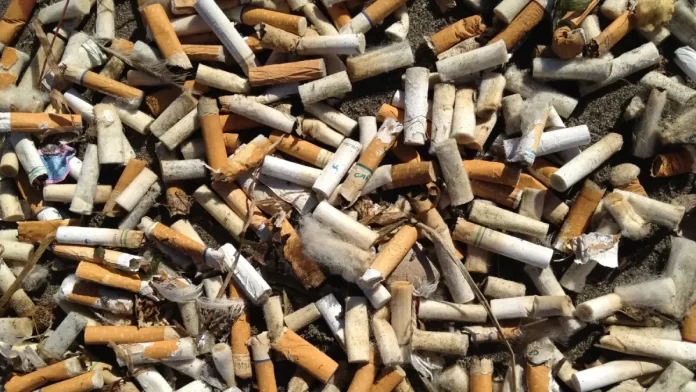When we think of plastic pollution, images of plastic bottles and straws often come to mind. However, a lesser-known yet pervasive culprit reigns supreme: cigarette butts.
Surprisingly, cigarette butts are the most abundant form of plastic waste globally, numbering around 4.5 trillion and polluting our environment on a massive scale.
Despite popular belief, cigarette butts are not primarily composed of cotton or paper. They are made primarily of cellulose acetate, a synthetic plastic material.
These seemingly inconspicuous butts, tossed away without a second thought, harbor a multitude of toxic chemicals. As they slowly degrade, they release over 7,000 harmful chemicals, including known carcinogens like arsenic and lead.
The impact of cigarette butt pollution is especially pronounced in marginalized communities, where high smoking rates intersect with limited access to health resources and inadequate waste management services.
Furthermore, these tiny toxic pollutants pose a significant threat to marine life, with researchers frequently discovering them inside deceased sea birds, turtles, fish, and dolphins. The chemicals leaching from cigarette butts are lethal to freshwater and marine species, exacerbating the ecological crisis.
Addressing this issue requires collective action. Smokers can contribute by responsibly disposing of cigarette butts or using portable ashtrays. Additionally, community clean-up efforts, such as The Great Global Cleanup, play a crucial role in removing these pollutants from the environment.
In light of World Cleanup Day’s focus on cigarette butt pollution, individuals are encouraged to join efforts to clean up their local environments. Advocating for comprehensive waste management policies and raising awareness about the dangers of smoking are also vital steps toward creating cleaner communities and a healthier future for all.
Intake of this News
- Cigarette butts, not plastic bottles or straws, are revealed as the most prevalent form of plastic waste globally, with an estimated 4.5 trillion butts polluting the environment.
- Despite common misconceptions, cigarette butts are primarily made of cellulose acetate, a synthetic plastic material, and contain over 7,000 harmful chemicals, including known carcinogens like arsenic and lead.
- Marginalized communities face disproportionate impacts from cigarette butt pollution due to higher smoking rates and limited access to health resources and waste management services.
- Cigarette butt pollution poses a significant threat to marine life, with researchers finding them inside deceased sea birds, turtles, fish, and dolphins, while the chemicals they release have been deemed lethal to freshwater and marine species.
- Addressing this issue requires collective action, including responsible disposal by smokers, community clean-up efforts like The Great Global Cleanup, and advocacy for comprehensive waste management policies and smoking cessation programs.



